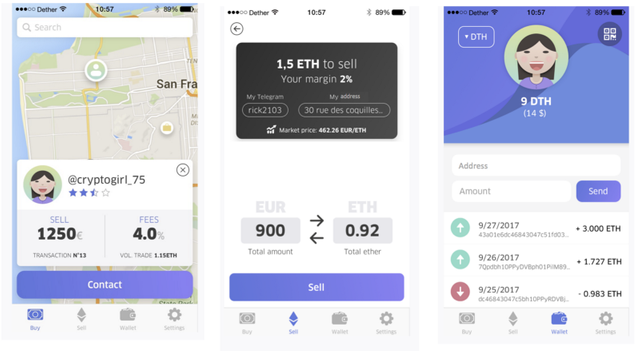The Good, the Bad, and the Ingenuitive: what it is really like to buy and sell cryptocurrency across the globe.
Over the past two months, the Dether marketing team completed a set of customer interviews, on what current solutions are being used for buying and selling cryptocurrency globally and what issues individuals from different continents are facing?

A Closer Look at the Needs of Potential Dether Users Across the Globe
Knowing your target audience should be everyone’s top business obsession. Since the beginning of our journey at Dether, we’ve always asked ourselves:
Who are we targeting?
What problems are these people facing?
To what extent does the situation differ from one region to another?
How are we going to reach them?
These questions seem simple; yet, they are crucial for our success! It has led us to meet with our potential community of users for the past months during the Dether World Tour to better understand their needs and frustrations, and this has proven to be a golden opportunity to better shape Dether.Following the same path, we conducted 10 interviews over the past weeks, with participants from Europe, Asia, and Africa. Our goal was to speak with crypto enthusiasts from many different regions, in order to find out more about our potential early adopter base, and how we could better tailor Dether to their needs.Most interviewees reported using well-known exchanges such as Coinbase, Bittrex, and Bitfinex. In order to find out about new currencies, or how to use an exchange, participants cited online forums, such as Bitcoin Talk, personalized WhatsApp groups, Telegram goups, Reddit and Facebook.Most participants cited financial opportunity as their main interest in cryptocurrency. Participants in Europe and Asia cited high satisfaction with the current exchanges.Participants in Africa, particularly Nigeria, Tanzania and Senegal, cited the use of informal P2P networks created via groups of interested friends and colleagues on WhatsApp. They rated their satisfaction of these solutions as very low.In regions where the unbanked rate is higher, such as Singapore and India, direct cash-in solutions were also cited, such as those located in convenience shops. In the Gulf, users can cash-in directly at their local bank, which is presented as a “safer” solution to the public.
Current problems when buying and selling cryptocurrency
1/ Ease of use
Amongst complaints about currency solutions were the overall ease-of-use of such solutions. Assuming that one has the correct currency, a bank account, and the documents necessary to complete the Know Your Customer (KYC), incidents of server crashes were cited as one of the most problematic issues with exchanges. As price rises, more people try to access an exchange at once, causing the exchange server to crash. This is especially the case in in India, Nigeria, Tanzania , and Senegal. Even in well-connected countries like the Czech Republic, where the exchange process can be cumbersome.
Nikola* in Prague

“It takes one or two days to get the money from your bank account, then more time to buy Bitcoin, then to send it to exchanges. It’s not decentralized. You have to send so many documents to third parties and sometimes you don’t know if it’s secure.”
2/ Time Constraints
Participants cited long-wait times as an issue with both exchanges and traditional remittance solutions, like Western Union. Although most local banks are able to transfer money fairly quickly within the country, the process becomes much more difficult on an international scale. Because exchanges function like a traditional bank transfer, many participants said that they ended up losing money due to long wait times and time off for weekends, coupled with bank account issues, currency issues, and problems with documentation.
Emanuel* in Tanzania
We spoke to Emanuel* in Tanzania, who talked about problems with the high-fees of remittance solutions, and the currency exchange solutions that exist locally. Although P2P solutions are scattered across the country in the form of Whatsapp groups, LocalBitcoin, or Remitano, they lack many convenience features — such as figuring out where a potential trader lives.

“I use groups on Whatsapp to find people to meet up with to trade,” said Emmanuel*. “It’s difficult. There’s not many people on Remitano. We don’t know where the person is located. Once you find someone, you have to call them on Whatsapp to find out where they are located, if they’re in Dar es Salaam or wherever so we can pick a date to meet up. Sometimes no one wants to buy! It’s much harder to buy than to sell .You have to advertise on Whatsapp in advance. It’s really hard if you need fast cash.”
3/ Currency and Bank Account Issues
Many users face the issue of their local currency not being accepted by exchanges. They are thus obligated to obtain an accepted currency, such as US Dollars or Euros, or to opt for informal P2P exchanges Those that have a bank account, which is already a difficult task in some regions, must find an exchange where they can exchange or purchase using their local card, which is extremely rare. Others may resort to use a system of “couriers,” which isthe case in Nigeria or Senegal. Users will find someone who is traveling abroad to France or the United States, and pay them to bring back accepted currencies. These “couriers” are able to charge high fees for such services.
Moussa* in Senegal
“Getting cryptocurrency can be difficult in Senegal. Normally you can’t use an exchange with CFA, unless it’s an international site, but the fees are very high. So first you have to find Euros. Where are you going to get Euros? This is the most difficult part. You have to know someone, or find somone who’s traveling. Otherwise you have to try and find a solution somewhere like Dakar. We don’t have any local sites that accept CFA, and this is the biggest problem by far.”
Anthony* in the Democratic Republic of the Cong
“Cryptocurrency is very complicated in the Congo. You can’t use the Franc Congolais on an exchange, and our economy is very particular — many prices of goods are based on the value of the American Dollar. People are using American Dollars as a safe-haven currency.”
4/ Documentation Problems
One of the biggest obstacles to accessing an exchange in Nigeria, for example, is not being able to successfully complete the KYC process, or only being able to access Tier 1. This is because most people are only issued a national ID card, which is currently undergoing an update. This means that half of the population still doesn’t have the new card, which is accepted by exchanges. Beyond that, only a fraction of the country has a passport. Passports are both expensive and scarce, which may even contribute to the inflation rate. Nigerians who have a bank account are thus excluded from exchanges if they do not have a passport.
Gabriel* in Nigeria
Gabirel told us about how many Nigerians first became aware of cryptocurrency after the Mavrodi Mondial Moneybox Ponzi scheme that implicated many Nigerians in 2016. Despite this shaky first impression, the contry has become very interested in Bitcoin, and began to seen cryptocurrency as the future of finance in Nigeria.

“First off, not everone has a bank account. Another big problem is completing the KYC. Many Nigerians don’t have a passport because it can be very expensive. Every Nigerian must have the national ID card, but the government is in the process of updating them, so about half the population still has the old card. This makes it impossible to complete the KYC to use an exchange.”
5/ Government Opposition
Almost all participants cited government opposition as a problem. In some cases, cryptocurrency exchanges were unaccesible for citizens all together, such as in the case of Vietnam. Our Vietnamese participant explained to us how he was able to access exchanges using his French passport. In Nigeria, cryptocurrency, especially Bitcoin, has been presented as a Ponzi scheme, and citizens are discouraged from using it. Despite a general fear of cryptocurrency, no one mentioned government regulations of financial applications.
Phan Văn Đuc* in Vietnam
“The Vietnamese government doesn’t regulate crytocurrency presently, and is overall very scared of it. If I didn’t have a second passport like I do, I simply wouldn’t be able to access any cryptocurrency on any exchange. I really hope they’ll take direction from some of their neighbors in the future.”
6/ Safety Concerns
Participants in India, Senegal, Nigeria, Tanzania, and Congo expressed concerns over the safety of a P2P solution, and cited the difficulties of safely meeting with someone in person in a rural area, where the police may be less active, or where there is a lower concentration of public meeting points, such as cafés and restaurants. Participants also cited previous Whatsapp scams, in which the agreed to a trade, and the user blocked them before it was completed.
Rohit* from the Gulf
“I’m currently living in the Gulf, where the process to buy cryptocurrency might look straightforward— most people just go to their local bank and cash-in this way, but the fees are enough to tear you apart and most debit cards don’t work at all. It’s physically safe (because you’re not exchanging directly with another person in public) but it’s a huge hassle. I’m originally from India, and I have a lot of concerns about the safety of meeting up with someone. In rural areas, there might not be a place to meet or a lot of police around. There’s no system that could prevent you from having your money taken from you.”
Gabriel* from Nigeria
“There are so many scams out there on Whatsapp — it’s very easy to agree to conditions, send your money, and have the person block you. In the very early days, it even happened to me!”
Smartphone Penetration, Overall Community Interest in Crypto
Smartphone penetration was cited as generally high in every region.Most participants cited Android as the most popular OS in their region.Apple products and the App Store are regarded as too expensive according to participants in Singapore, Nigeria, Senegal, Congo, and Tanzania. Smartphone literacy was generally regarded as high in all regions. Some participants were particularly optimistic about the future of cryptocurrency in their home countries. Especially Michelle from Singapore.
Beth* in the Philippines
“Most people here use Abra wallet. I’m currently teaching all my friends and family how to use it. Most of them are using it to trade and others as an investment. Cash is still very popular here, and not everyone has a bank account. Some employees will have their payroll accounts in the bank, but usually most people are still paid in cash, especially minimum wage earners. This is why it’s convenient to cash-in at 7–11.”
After interviewing individuals from all over the world over the past few months, the whole team has been working day and night in parallel to prepare for Dether’s beta launch on Ethereum Main Net.
Releasing Dether’s beta mobile app on Ethereum Main Net
Dether’s token sale took place a couple weeks ago, now Dether’s beta mobile app is getting ready to be available on Ethereum main net

Coming soon on https://dether.io
Last October, we introduced you the Alpha version of Dether running on Ethereum Kovan test net. So far, more than 4000 users from all over the world have registered a crypto point of sell.
Now, Dether’s main net version will give users the ability to use their Dether wallet on Ethereum main net. We will then add features to enable them staking ÐTH tokens in order to add a sell point on the Dether map and trade Ether for cash — all while receiving a better reputation based on the number and volume of trades.
Want us to keep you updated? Join Dether’s community!





